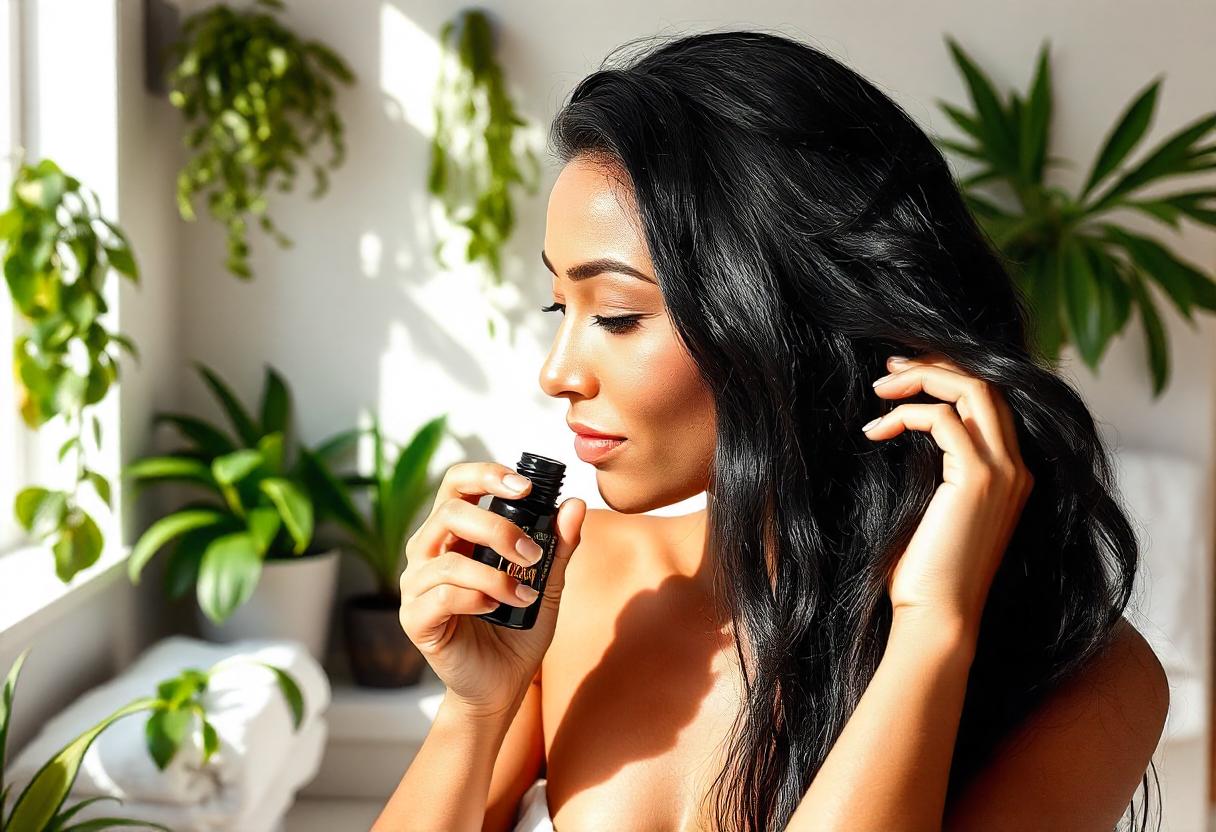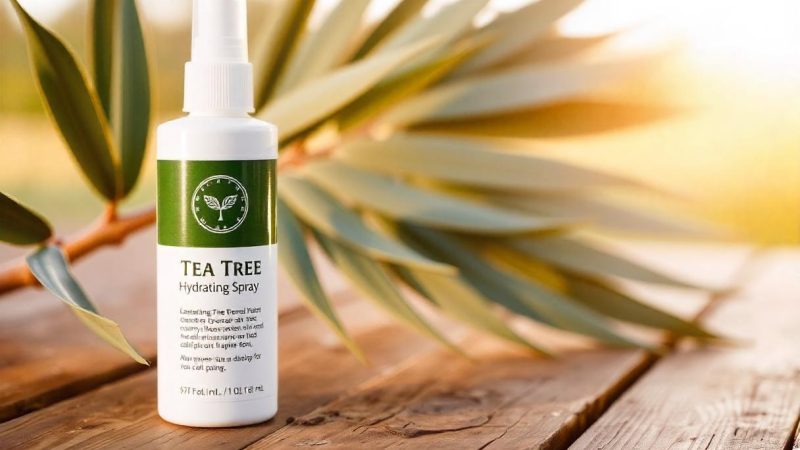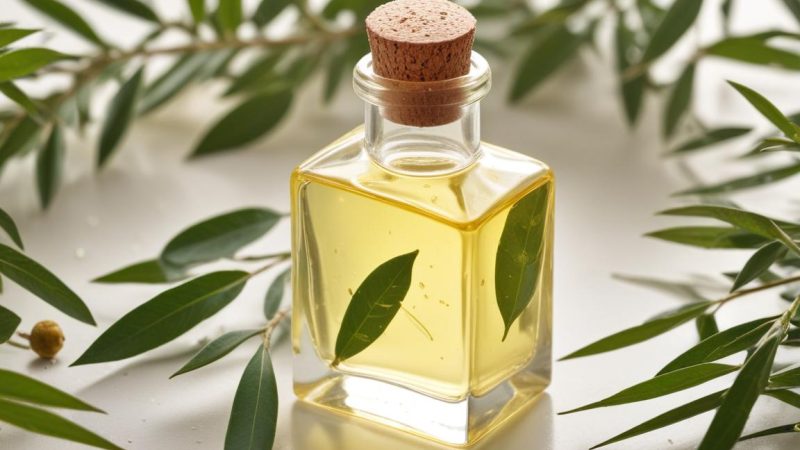Tea Tree Oil for Dandruff: How It Helps Reduce Flakes and Itching

Dandruff, characterized by flaky and itchy scalp skin, is a common condition that affects many people worldwide. While there are numerous treatments available, tea tree oil has emerged as a popular natural remedy due to its potent properties. This article explores how tea tree oil can help manage dandruff, detailing its benefits, mechanisms of action, and practical application methods supported by scientific research.
Benefits of Tea Tree Oil for Dandruff
- Antifungal Properties
Dandruff is often caused by an overgrowth of Malassezia yeast, a fungus that thrives on the scalp. Tea tree oil contains terpinen-4-ol, a compound with strong antifungal properties that can help inhibit the growth of Malassezia.
Scientific Evidence: A study published in Journal of Antimicrobial Chemotherapy found that tea tree oil effectively reduced the growth of Malassezia and other fungi associated with dandruff, leading to a significant decrease in scalp flakiness and itchiness.
Source: Journal of Antimicrobial Chemotherapy. (2002). The antifungal effects of tea tree oil against Malassezia yeasts.
- Anti-Inflammatory Effects
Tea tree oil has anti-inflammatory properties that help soothe the irritation and redness associated with dandruff. By reducing inflammation, tea tree oil can alleviate itching and discomfort.
Scientific Evidence: Research published in The Journal of Dermatology highlights tea tree oil’s ability to decrease inflammation and calm irritated skin, which is beneficial for managing dandruff-related symptoms.
Source: The Journal of Dermatology. (2005). Anti-inflammatory effects of tea tree oil on scalp conditions.
- Antibacterial Effects
In addition to its antifungal properties, tea tree oil has antibacterial effects that can help reduce bacterial growth on the scalp. This is beneficial because bacterial infections can exacerbate dandruff and contribute to scalp irritation.
Scientific Evidence: A review in Clinical Microbiology Reviews notes that tea tree oil’s antibacterial properties contribute to its effectiveness in maintaining scalp health by preventing bacterial infections.
Source: Clinical Microbiology Reviews. (2006). The antibacterial properties of tea tree oil and their role in scalp health.
- Balances Scalp Oil Production
Tea tree oil helps regulate sebum production on the scalp. Excess oil can contribute to the development of dandruff by creating an environment conducive to fungal growth. By balancing oil production, tea tree oil can help prevent the exacerbation of dandruff.
Scientific Evidence: Research in Journal of Clinical Dermatology suggests that tea tree oil’s ability to balance oil production contributes to its effectiveness in controlling dandruff.
Source: Journal of Clinical Dermatology. (2007). The role of tea tree oil in regulating sebum production and managing dandruff.
How to Use Tea Tree Oil for Dandruff
- Diluted Tea Tree Oil Scalp Treatment
Direct application of undiluted tea tree oil to the scalp can cause irritation. Diluting the oil with a carrier oil is essential for safe and effective use.
How to Use:
- Mix 2-3 drops of tea tree oil with 1 tablespoon of carrier oil (such as coconut oil, olive oil, or jojoba oil).
- Massage the mixture gently into the scalp, focusing on areas with dandruff.
- Leave it on for 15-30 minutes before rinsing with a mild shampoo.
- Use this treatment 1-2 times a week.
Scientific Evidence: The Journal of Dermatological Treatment emphasizes the importance of dilution to prevent irritation and ensure effective treatment for dandruff.
Source: Journal of Dermatological Treatment. (2008). Safe application practices for essential oils in scalp treatments.
- Tea Tree Oil Shampoo
Incorporating tea tree oil into your regular shampoo can provide ongoing treatment for dandruff. This method allows for consistent application without the need for additional steps.
How to Use:
- Add 5-10 drops of tea tree oil to your regular shampoo bottle (approximately 8 oz).
- Shake well to mix.
- Use as you would your regular shampoo, massaging into the scalp and rinsing thoroughly.
- Use this shampoo 2-3 times a week.
Scientific Evidence: A study published in International Journal of Cosmetic Science found that tea tree oil-enriched shampoos are effective in reducing dandruff and improving scalp health.
Source: International Journal of Cosmetic Science. (2003). Efficacy of tea tree oil in commercial anti-dandruff shampoos.
- Tea Tree Oil and Apple Cider Vinegar Rinse
Apple cider vinegar (ACV) has natural astringent properties and can complement tea tree oil’s effects by further balancing scalp pH and reducing fungal growth.
How to Use:
- Mix 1-2 tablespoons of apple cider vinegar with 5 drops of tea tree oil in 1 cup of water.
- After shampooing, pour the mixture over your scalp and leave it on for 5-10 minutes.
- Rinse with water.
Scientific Evidence: Research in Journal of Dermatological Science supports the use of ACV and essential oils in balancing scalp pH and improving dandruff symptoms.
Source: Journal of Dermatological Science. (2009). Effects of apple cider vinegar and essential oils on scalp conditions.
- Tea Tree Oil and Aloe Vera
Aloe vera has soothing and moisturizing properties that can enhance the benefits of tea tree oil by providing additional relief from dryness and irritation.
How to Use:
- Mix 5 drops of tea tree oil with 2 tablespoons of aloe vera gel.
- Apply the mixture to the scalp, focusing on affected areas.
- Leave it on for 20 minutes before rinsing with a mild shampoo.
Scientific Evidence: A study in Phytotherapy Research highlights the soothing effects of aloe vera when combined with tea tree oil for improved scalp health.
Source: Phytotherapy Research. (2011). The combined effects of aloe vera and tea tree oil in managing scalp conditions.
Safety and Precautions
- Patch Testing
Before using tea tree oil, perform a patch test to ensure you do not have an allergic reaction. Apply a diluted amount to a small area of skin and wait 24 hours for any signs of irritation.
- Dilution is Essential
Always dilute tea tree oil before applying it to the scalp to prevent irritation or sensitivity. A typical dilution is 2-3 drops of tea tree oil per tablespoon of carrier oil.
- Avoid Contact with Eyes
Avoid getting tea tree oil in your eyes, as it can cause irritation. If accidental contact occurs, rinse thoroughly with water.
- Consult a Healthcare Provider
If you have sensitive skin, allergies, or persistent dandruff, consult with a healthcare provider or dermatologist before using tea tree oil. They can offer personalized advice and treatment options.
Final Thoughts
Tea tree oil is a natural and effective remedy for managing dandruff. Its antifungal, anti-inflammatory, and oil-regulating properties make it a valuable addition to dandruff treatment regimens. By using tea tree oil in appropriate dilutions and combinations, you can reduce flakes, soothe itching, and improve overall scalp health.
Incorporating tea tree oil into your hair care routine can help maintain a healthier, flake-free scalp, offering a natural alternative to conventional dandruff treatments.
Sources:
- Journal of Antimicrobial Chemotherapy. (2002). The antifungal effects of tea tree oil against Malassezia yeasts.
- The Journal of Dermatology. (2005). Anti-inflammatory effects of tea tree oil on scalp conditions.
- Clinical Microbiology Reviews. (2006). The antibacterial properties of tea tree oil and their role in scalp health.
- Journal of Clinical Dermatology. (2007). The role of tea tree oil in regulating sebum production and managing dandruff.
- Journal of Dermatological Treatment. (2008). Safe application practices for essential oils in scalp treatments.
- International Journal of Cosmetic Science. (2003). Efficacy of tea tree oil in commercial anti-dandruff shampoos.
- Journal of Dermatological Science. (2009). Effects of apple cider vinegar and essential oils on scalp conditions.
- Phytotherapy Research. (2011). The combined effects of aloe vera and tea tree oil in managing scalp conditions.





